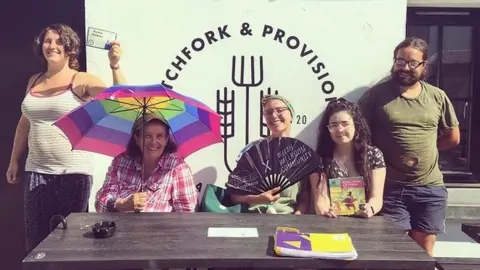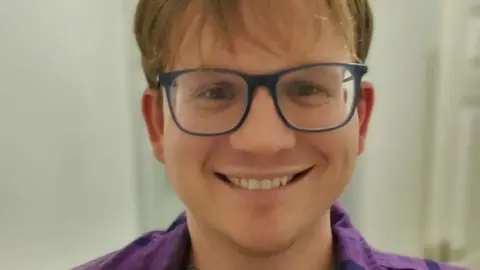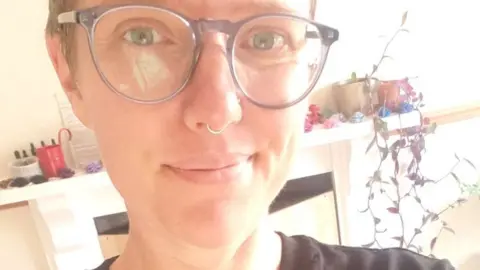Welsh language: Non-binary speakers want gender-neutral help
 Ella Peel
Ella PeelNon-binary Welsh speakers have said they feel unable to express their identities in the language due to its gendered nature.
They want to see more awareness and use of inclusive LGBTQ+ language.
Like many European languages, Welsh nouns are gendered, which changes their mutations, and professions also tend to be gendered.
One tutor working for the government-funded Welsh learning programme, Dysgu Cymraeg, has altered his teaching.
Tomos Hopkins said it has led to more inclusivity towards a non-binary student but he added first-language Welsh speakers are less likely to encounter gender-neutral Welsh.
Many non-binary people use the plural "nhw" as a gender-neutral singular pronoun.
Plural mutations can be used to talk about a person in the singular - eliminating gendered mutations for many words.
However, many professions are gendered, such as the word "athro" for a male teacher and "athrawes" for a female.

The lack of knowledge of LGBTQ+ terms in Welsh means when people use "nhw" sometimes they are unable to be understood, according to Rowan Gulliver, a 22-year-old teacher in Barry, Vale of Glamorgan.
Working in a Welsh-speaking school, Rowan - who uses the non-binary Mx prefix and they/them pronouns - had to come out to colleagues in English because they did not feel they could be understood in Welsh, nor did they have the vocabulary to do so.
"You should be able to speak about your identity and other people in your first language," they said. "It's like a little part of you is dying when you have to say it in English."
"It just makes you feel like... you're some strange thing that doesn't belong or have value within society," they added.
Though the vocabulary does exist, it is not in common use.
Mx Gulliver said Welsh-speakers will understand if terms are explained, but the language barrier stops non-binary people from being confident in talking about their identity.
"It's like you have to come out twice," they added.
While dictionaries lack many words which would help to describe LGBTQ+ identities, Stonewall Cymru has an inclusive Welsh glossary to fill these gaps.
"There needs to be more awareness, more representation in the media like S4C and it needs to be taught in schools," Mx Gulliver explained.
For those learning Welsh, there are more opportunities to learn non-gendered ways of speaking.
"The gendered nature of the language makes me feel excluded and not sure where I fit in," Ems Rixon, 38, from Llandeilo, Carmarthenshire, said.
"Often I feel like I am causing problems in my speaking classes when I say that I don't want to say one gender or another."
Mx Rixon said non-binary people were often told to use the plural but were also corrected by others when they did.
Mx Rixon's Welsh tutor Mr Hopkins changed lesson material for new learners to be inclusive to non-binary identities.

The Learn Welsh textbooks used by Dysgu Cymraeg are also updated every two years, meaning they are able to update the way it is taught to be more inclusive.
Mr Hopkins said the way to increase knowledge of correct pronouns is to increase representation in the media.
"I think it is certainly getting better with programmes like S4C Hansh," he added. "I think they're doing a brilliant job of showing lots of queer identity content.
"It's extremely important the Welsh language evolves and is inclusive, the language dies if it gets stuck in a box that stays with the old ways.
"There's new words for everything everyday. Over the pandemic there had to be new terminology to describe technology, so this is just a natural step for the language."
LGBTQ+ words have been coined in Welsh for several years, but have not yet passed into common usage, said Dr Gareth Evans Jones, of Bangor University, who is editing the first Welsh-language anthology of LGBTQ+ rights.
"I think because Welsh is so deeply rooted in gendered terms, it would be difficult to try to de-gender the language," he said. "But if newer terms were coined as alternatives to these gendered terms, that certainly is a possibility."
To help other non-binary Welsh speakers, Ella Peel, the founder of Heart of Wales LGBTQ+ set up Cymuned Cymraeg, a fortnightly Welsh speaking group in east Carmarthenshire and Powys.
"The purpose of language is to understand each other and to communicate, so if you're saying words and people don't understand you, that's when language breaks down," Ms Peel said.
The class practices using "-ydd" for gender neutral endings. This is already in use for some professions such as commissioner which is "comisiynydd" in Welsh and has no gender.
Mx Rixon added: "Representation is so important. You can only be what you see and can talk about."

- IT'S SHOWTIME: Luke Evans hosts an unforgettable night of music
- DABBERS AT THE READY: A glimpse into life at a Tonypandy bingo hall

